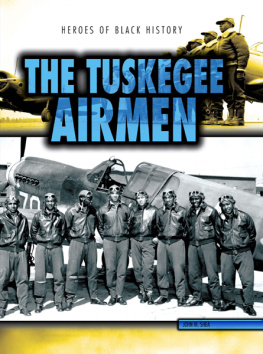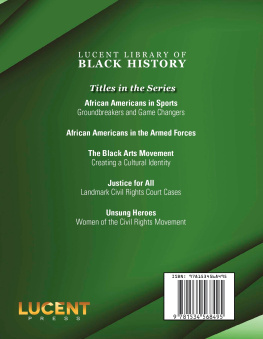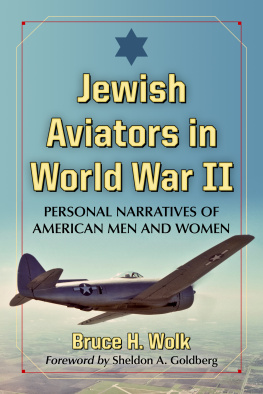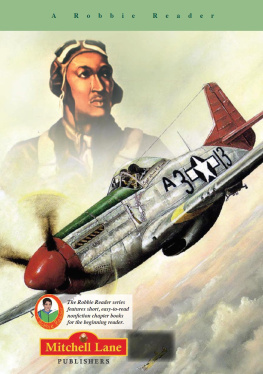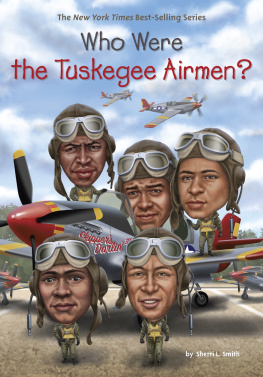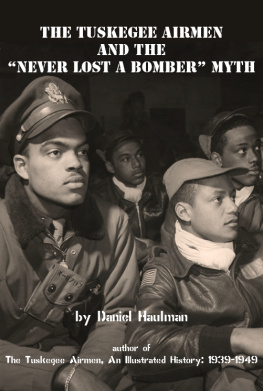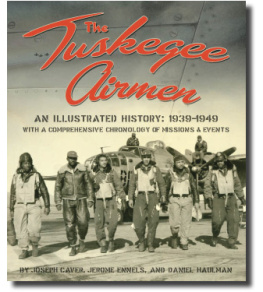To the men and women of Tuskegee who served their families, their communities and their nation throughout their lives. Their legacy endures.
PREFACE
In the early summer of 2018, my colleague at the American Helicopter Museum and Education Center, education director Paul Kahan, informed me that the president of the Philadelphia Area Chapter of the Tuskegee Airmen, Mr. Mel Payne, wished to speak with me. Of course, I consented immediately. At the time, I assumed that Mr. Payne wanted to discuss an oral history initiative. There remained only a few living Tuskegee Airmen in the area, and it made sense to capture their reflections on their experiences during the Second World War during that conflicts seventy-fifth commemoration.
As one who writes and teaches American military history, and as one who taught African American history as a high school social studies teacher in Philadelphia, Pennsylvania, I relished the opportunity to work with the chapter. From my time in Philadelphia, I knew city residents rightfully revered the chapters members. The men and women of Tuskegee gave of their time generously, whether at air shows, ballgames or in classrooms, and their ongoing service to the community struck me and my students as impressive.
I had never met Mel before. A successful businessman, his contributions to the Philadelphia chapter over nearly two decades are noteworthy, particularly in working to keep the Tuskegee legacy alive for our regions youth, who benefit from its inspiration. Mels work for the chapter is tireless, especially as he possesses no personal ties to the Tuskegee Airmen.
Mel learned of the groups history from an exhibit at the Wright-Patterson Air Force Base that he encountered while on a business trip through Dayton, Ohio. The history he saw chronicled there transformed him. Mel returned to Philadelphia, sought out the citys chapter and continues to serve it with great energy.
I looked forward to meeting Mel but did wonder about the necessity of another oral history endeavor. The Tuskegee experience, particularly in the last thirty years, received a good deal of attention from the press, historians and even Hollywood. I wondered what another history might add to the existing historical documentation. I need not have worried. I knew this within the first few moments I spent with Mel.
Mel came to my office at West Chester University, and we talked. He quickly explained that the chapter possessed plenty of oral historiesit required no more. Instead, he wanted to talk about the idea he had for a book. While many now knew of the Tuskegee Airmen and the groups experience during the Second World War, they only possessed a superficial understanding. One that privileged the pilots to the exclusion of everybody elsemechanics, nurses, administrative staff, even bombers. And of course, as Mel pointed out, almost nobody understood the role that women played in the Tuskegee experience.
The merits of Mels proposal appeared obvious. I knew this as a teacher, observing in textbooks and other materials made for students, particularly during Black History Month. Most schools now teach the importance of the Tuskegee Airmen but do so in what I call a fly by fashion. The kind of book Mel suggested promised to serve as a corrective, to render the Tuskegee experience in its historical complexity.
Moreover, it contained the chance to provide deserving role models of every member, in addition to the fighter pilots. Thinking along these lines, Mel shared his hope of providing scholarships to young people tied to the various types of service that the men and women of Tuskegee performed. Mel and I quickly agreed any book we produced should serve as a means for that: to fund scholarships. All author proceeds from this work will do just that.
I became excited, especially at the prospect of bringing in some of my universitys finest young historians to collaborate with me in completing the project. This provided an excellent opportunity for West Chester University history students to do history, to help Mel and me render as better understood such an important part of our nations past. Yet, Mel had more.
The other thing people did not understand widely, Mel explained, is that the stories of the men and women of Tuskegee did not end with the Second World War. They returned home, many to the greater Philadelphia area, only to experience the same racism they confronted prior to serving their country. Nothing changed, but they had. They possessed a new strength and the resolve to persevere. They did this and passed it along to their families and to others in the community.
Mels observation resonated. Educators and others often present history in compartmentalized fashion. Chapters in textbooks on events such as World War II and the civil rights movement make history more manageable for teachers and students. They artificially disconnect reality, though. They do not succeed in demonstrating the frustrations experienced by African Americans who served their country despite racial oppression abroad and how that contributed to their willingness to continue serving their nation by fighting against racism at home.
So many of the men and women of Tuskegee who returned to Philadelphia dedicated their livesnot just a few yearsto serving the greater good. They won many battles. This story needs telling, as all these years later, many battles remain. The Philadelphia chapter of Tuskegee Airmen offers hope that they might yet be won. I knew this immediately in meeting with the many family members who contributed to this book. They shared their memories and their pride of the legacies left by their parents and grandparents, their uncles and aunts. Tuskegee forever shaped their families. Their gratitude fills them with a powerful drive to give back. They do this with great success.
This book conveys the experiences of the men and women of Tuskegee, largely through their own words and those of their families. It calls attention to the desire of young African American men and women, seventy-five years ago, to fight for the right to serve their country. Once they secured that, they never stopped. The city of Philadelphia and the United States of America are better as a result. Grasping this history, in all its complexity, enables the men and women of Tuskegee to continue to serve us all.


